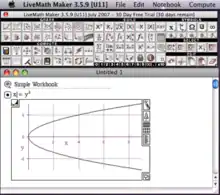LiveMath
LiveMath is a computer algebra system available on a number of platforms including Mac OS, macOS (Carbon), Microsoft Windows, Linux (x86) and Solaris (SPARC). It is the latest release of a system that originally emerged as Theorist for the "classic" Mac in 1989, became MathView and MathPlus in 1997 after it was sold to Waterloo Maple,[1] and finally LiveMath after it was purchased by members of its own userbase in 1999.[2][3] The application is currently owned by MathMonkeys of Cambridge, Massachusetts. The overall LiveMath suite contains LiveMath Maker, the main application, as well as LiveMath Viewer for end-users, and LiveMath Plug-In, an ActiveX plugin for browsers,[4] which was discontinued in 2014.[5]
 | |
 LiveMath screen snap showing the (busy) palette and a simple worksheet with a graph of | |
| Developer(s) | Theorist Interactive, LLC (1999-2004, 3.0-3.5.6) MathMonkeys, LLC (2004-, 3.5.7-) |
|---|---|
| Stable release | 3.6.0
/ January 2017 |
| Operating system | Mac OS X 10.4, Microsoft Windows XP, Linux (i386 Ubuntu 11.04, Redhat Linux, CentOS) |
| Platform | Cross-platform |
| Type | Computer algebra system |
| License | Proprietary |
| Website | www |
Description
LiveMath uses a worksheet-based approach, similar to products like Mathematica or MathCAD. The user enters equations into the worksheet and then uses the built-in functions to help solve them, or reduce them numerically. Workbooks typically contain a number of equations separated into sections, along with data tables, graphs, and similar outputs. Unlike most CAS applications, LiveMath uses a full GUI with high-quality graphical representations of the equations at every step, including input.
LiveMath also allows the user to interact with the equation in the sheet; for instance, one can drag an instance of to the left hand side of the equation, at which point LiveMath will re-arrange the equation to solve for . LiveMath's algebraic solving systems are relatively simple compared to better known systems like Mathematica, and does not offer the same sort of automated single-step solving of these packages.
References
- A Brief History of LiveMath Archived 2008-02-21 at the Wayback Machine
- Waterloo Maple sells MathView & Expressionist Product Line to WebPrimitives, LLC of Cambridge, Massachusetts
- Waterloo Maple sells MathView & Expressionist Product Line to WebPrimitives, LLC of Cambridge, Massachusetts
- LiveMath Products
- "LiveMath™ Plug-In".